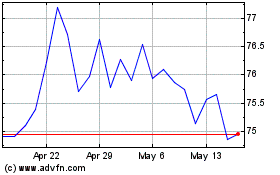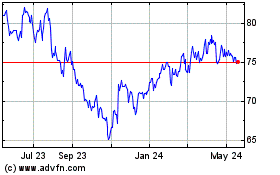New Report Reveals Alarming Decline in Women’s Cancer Testing Worldwide
22 January 2025 - 12:00AM
Business Wire
Women’s cancer testing has declined globally, according to the
latest Hologic Global Women’s Health Index, one of the largest
collections of data on women’s health and well-being.
This press release features multimedia. View
the full release here:
https://www.businesswire.com/news/home/20250121461870/en/
Hologic, Inc. (Nasdaq: HOLX), a leading women’s health
innovator, partners with Gallup to create the Index. Now in its
fourth year, the Index raises new concerns about declining trends
in women’s health. For the first time in the history of the Index,
women’s cancer testing declined: Only 10% of women surveyed
worldwide said they were tested for any type of cancer in the
past year, down two percentage points from the first two years of
the Index.
This year’s Index will be released today during an event
convened by Goals House, a community focused on driving progress
toward the United Nations (UN) Sustainable Development Goals (SDGs)
alongside the World Economic Forum in Davos, Switzerland. The event
will feature a panel including Dr. Natalia Kanem, Executive
Director of the United Nations Population Fund (UNFPA), Dr.
Sania Nishtar, CEO, Gavi, The Vaccine Alliance and Elissa
Miolene, Global Development Reporter, Devex.
“Today’s data reveal a worsening trend in women’s health,” said
Stephen P. MacMillan, Chairman, President and CEO of Hologic. “The
shocking decline in cancer testing is a wake-up call. Business as
usual is not working. Innovative strategies and collaborative
efforts are needed to make sustained improvements in women’s health
and well-being around the world.”
Key findings from this year’s
Index:
- Cancer Screening Among Women Declined: Only 10%
of women said they underwent any type of cancer testing in the past
year, reflecting a decrease of two percentage points from the first
two years of the survey.
- Women Are Struggling More to Meet Basic Needs: A
staggering 38% of women reported being unable to afford food
at some point in the past year, marking the highest level of food
insecurity in nearly two decades. And 32% of women said they
could not afford adequate shelter.
- More Women Are Worried and Sad: More women reported
feeling worried (42%) and sad (30%) compared to Year
1 of the Index. And over one third (35%) said they felt
unsafe in their communities.
- Ongoing Physical Pain and Health Issues: 34% of
women reported experiencing significant pain the previous day,
while 26% indicated that health problems impacted their
ability to engage in everyday activities.
- HIV Testing Rates for Women Are Alarmingly Low: The
Index assessed women’s HIV testing for the first time and found
concerning disparities: Less than 0.5% of women were
tested in certain countries, primarily those in the Middle East and
North Africa, and no country scored above 41%. Globally, the
percentage is much lower. Just 6% of women — regardless of
whether they visited a healthcare professional or were tested for
STIs — said they were tested for HIV in the past year.
- Signs of Hope — Some Countries Are Making Progress:
28 countries saw meaningful increases in their Index scores
since the first year of the Index, including Kazakhstan, Kenya,
Poland and Venezuela.
The Index assigns a women’s health score to each country or
territory based on survey responses on five dimensions of health.
Overall, the world scored 53 out of 100 on the Index in Year 4,
reflecting no significant change since the Index started.
Taiwan led the world for the fourth consecutive year, scoring 68
out of a possible 100. Other top scores went to Kuwait (67),
Austria (66) and Switzerland (65). The lowest scores went to
Afghanistan (30), the Democratic Republic of Congo (34) and Chad
(35). The United States scored 60 – on par with New Zealand (60)
and Lithuania (60) – and fell seven places from its ranking in the
third year of the Index to 37 out of 142 countries and
territories.
The Index fills a critical gap in knowledge about the health,
safety and well-being of women worldwide. Based on interviews with
more than 146,000 women and men in 142 countries and territories,
it represents the voices of 97% of the world’s women and girls aged
15 and older.
To see the full Index and related resources, visit
WomensHealthIndex.com.
About Hologic, Inc.
Hologic, Inc. is a global leader in women’s health, dedicated to
developing innovative medical technologies that effectively detect,
diagnose and treat health conditions and raise the standard of care
around the world. For more information on Hologic, visit
www.hologic.com and connect with us on LinkedIn, Facebook, X,
Instagram and YouTube.
Hologic and The Science of Sure are trademarks and/or registered
trademarks of Hologic, Inc. and/or its subsidiaries in the United
States and/or other countries.
About Gallup
Gallup delivers analytics and advice to help leaders and
organizations solve their most pressing problems. Combining more
than 80 years of experience with its global reach, Gallup knows
more about the attitudes and behaviors of employees, customers,
students and citizens than any other organization in the world.
View source
version on businesswire.com: https://www.businesswire.com/news/home/20250121461870/en/
Investor Contact Michael Watts Corporate Vice President,
Investor Relations (+1) 858.410.8514 michael.watts@hologic.com
Media Contact Bridget Perry Senior Director, Corporate
Communications (+1) 508.263.8654 bridget.perry@hologic.com
Hologic (NASDAQ:HOLX)
Historical Stock Chart
From Dec 2024 to Jan 2025

Hologic (NASDAQ:HOLX)
Historical Stock Chart
From Jan 2024 to Jan 2025
